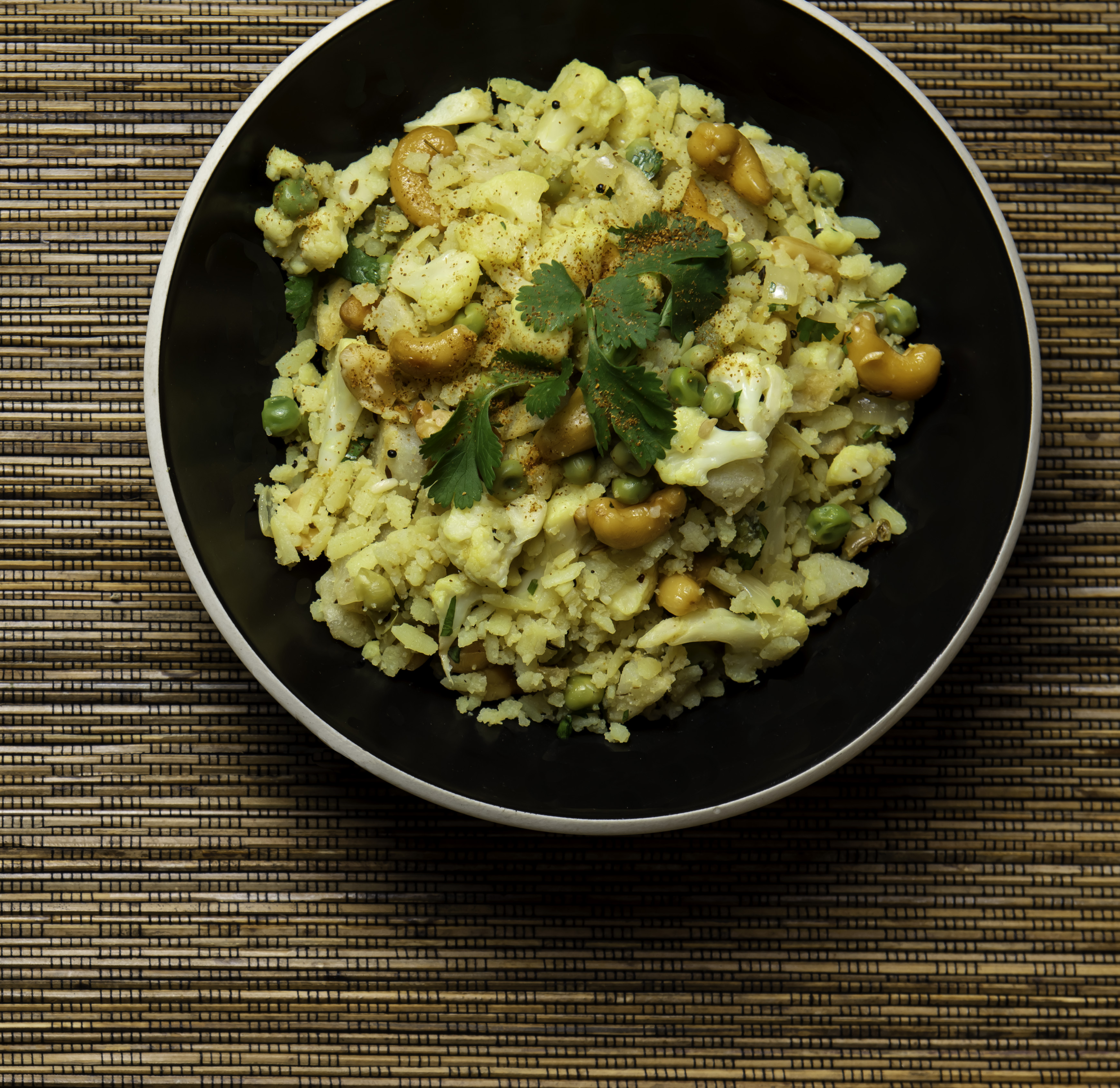On a long-ago idyll in India, I discovered unimagined rice delights. There were soft puffy rice cakes called idli commonly eaten in the morning. Pilaf-like biryanis. Sweet pongals. Here is a take on a rice dish you probably have never imagined, a poha.
While I try not to use difficult-to-find ingredients in Blue Cayenne recipes, poha is, I suspect, something you don’t normally keep in your pantry. You can find it on the shelves of most Indian markets and, of course, on Amazon. The Amazon link is here. Poha is inexpensive. You don’t have to invest a lot of money to give this rice dish a try.
If you are a little intimidated by the prospect of making this out-of-the-ordinary dish, here is a good You Tube video: Indian Poha. The recipe I’m posting below has some different ingredients, but the video will get you past your unfamiliarity in prepping poha. It’s easy.
This recipe is adapted from one that appears in Madhur Jaffrey’s wonderful cookbook, Vegetarian India. If you are vegetarian (and an adventurous cook) or if you are just trying to prepare more vegetable forward dishes, this cookbook would be a wonderful addition to your collection.
Jaffrey is an award-winning actress (Shakespeare Wallah)and an inspired cook. She has written numerous cookbooks, seven of which have won prestigious James Beard Awards. She has been quoted as saying that her three best/favorite cookbooks are An Invitation to Indian Cooking, A Taste of India and the book from which this recipe is adapted, Vegetarian India. If you want to dip your toe in the water before investing in one of her books, just type in Madhur Jaffrey on your browser and you will find a number of wonderful recipes.
As the story goes, Ismael Merchant (of the movie-making duo Merchant and Ivory–Howards End, Call Me By Your Name) set the young actress (she is now 84) up for an interview with the legendary NYT food writer Craig Claiborne. Worried about the inadequacy of her tiny NY kitchen, Jaffrey borrowed the kitchen of a friend and proceeded to prepare stuffed green peppers, sour cream koftas and raita for Claiborne. Lucky man, Claiborne.
That was 1966. The rest is history.
Claiborne wrote adoringly about her and her inspired Indian meal–Indian food was pretty unknown in America in 1966–and her career as an Indian food writer was launched.
I’m thinking it would be fun to recreate the meal Jaffrey prepared for Clairborne. Wanna come?
Ingredients
- 3 C. thick poha (flattened rice)
- 3 T. olive or peanut oil
- 1/2 t. whole brown mustard seeds
- 1/2 t. whole cumin seeds
- 1 medium onion peeled and chopped
- 2 t. peeled and very finely grated fresh ginger
- 2 C. very small cauliflower florets (1/2 inch wide and 1 inch long, well-washed and drained)
- 2 medium russet potatoes cut into small dice and boiled
- 1/4 C. cashew halves
- 1/4 t. ground turmeric
- 1 C. defrosted frozen peas
- 1 to 3 hot green chiles (finely chopped--I used one)
- Salt
- 1 T. lime juice
- Cilantro and raisins for garnish
Instructions
- Rinse the poha in a sieve under cold water. Drain and place in a bowl. Cover with water and soak for 2 minutes. Drain.
- Heat oil in a large nonstick frying pan over medium high heat. Add mustard seeds and cumin seeds. When the seeds start to pop, add the onions, ginger, potatoes, cauliflower and turmeric. Sauté for about 3-5 minutes over medium-high heat. You want the onions, potatoes and cauliflower to be lightly browned.
- Lower the heat in your pan to medium low and add peas, green chillies, 1/2 t. salt and the lime juice. Cook for 1-2 minutes to cook through.
- Meanwhile, saute cashew halves in a small amount of oil. Add to pan with onions, etc.
- Add the poha to your pan and mix to eliminate any lumps. Sprinkle 1/2 t. salt over the poha mixture and continue to heat for 3-4 minutes. Use a flat spatula for this step and lift the mixture from the bottom of the pan, folding the ingredients together. When the poha is well mixed and heated through, cover and set aside until you are ready to eat this wonderful dish.
- Just before serving garnish with cilantro and raisins.



 Save Recipe
Save Recipe

1 thought on “Pass the poha…”